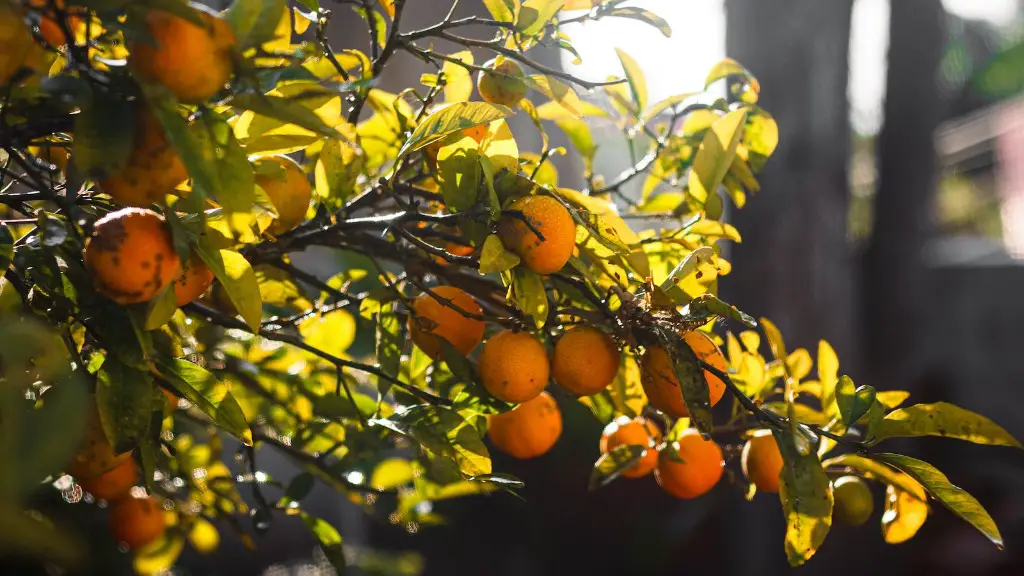As a citrus species, lemon trees thrive in warm climates, however, with some preparation and protection, they can also survive cold winters. To keep your lemon tree alive during the winter, here’s what you should do:
Firstly, prune the tree in late fall. This will help your lemon tree to recover in early spring, as it will have less deadwood that requires removal. Secondly, inspect the trunk and branches carefully for any signs of damage and injury. If you find any, trim them to help the tree stay strong. Thirdly, apply a layer of mulch around the tree. This will help retain moisture and keep the roots of the tree warm. Fourthly, wrap the tree with burlap or a blanket during cold nights. This will protect the tree from extreme temperatures and cold winds.
Fifthly, water your lemon tree every two weeks in winter. Make sure the soil is damp, but not too wet. Additionally, feed the tree an appropriate citrus fertilizer two to three times throughout the winter season. This will replenish the tree with essential minerals and help it to recover. Finally, monitor your lemon tree closely to see if it is under any pest pressure. Treat it with an appropriate insecticide or fungicide if needed.
How to Protect the Lemon Tree from Frost
Once temperatures get too cold, your lemon tree is at risk of frost damage. Here are a few tips to protect it:
Firstly, move your lemon tree to a sheltered spot, like against a wall or in front of a hedgerow, to reduce the risk of frost damage. Secondly, cover the tree with a frost cloth when temperatures get too low. This will trap the heat and protect the tree from frost damage. Thirdly, create an artificial heat source around the tree. During this period, you can use a heat lamp or an electric heater to help the tree during cold winter nights. Fourthly, spray water on the leaves of the tree during periods of frost or snow. This will create a heat buffer that will help reduce frost damage.
Fifthly, never leave your lemon tree uncovered during periods of snow and ice. Cover it with a waterproof cloth or tarp to protect it from extreme cold. Additionally, keep the root zone of the tree watered during periods of frost or snow, as the ground freezes and can become dry. Finally, monitor your lemon tree closely and take immediate action if you notice any signs of frost damage.
How to Fertilize the Lemon Tree in Winter
In order for your lemon tree to stay healthy during the winter season, it’s important to apply nutrients. Here are some tips for fertilizing the tree:
Firstly, choose an appropriate citrus fertilizer that is balanced in nitrogen, phosphorus and potassium. Secondly, apply this fertilizer in late fall, just before the onset of cold weather. Thirdly, mix the fertilizer in with the soil around the tree and water it in. Fourthly, apply fertilizer two to three times during the winter season, with the last application being four to six weeks before spring. This will help replenish essential nutrients in the soil.
Fifthly, foliar feeding is another good option during the winter. This is an effective way of delivering nutrients directly to the leaves of the tree. Additionally, the leaves of the tree can be sprayed with a mix of micronutrients, such as magnesium, zinc and iron. These micronutrients are essential for lemon trees, as they help to promote healthy growth. Finally, make sure to water the tree and its root zone regularly, as this will ensure that the fertilizer is properly absorbed by the tree.
How to Avoid Lemon Tree Diseases in Winter
Lemon trees can be prone to diseases in winter, so it’s important to take preventive measures to avoid them. Here are some tips for avoiding lemon tree diseases:
Firstly, inspect the tree regularly for any signs of pest or fungal activity. If you notice any, take action to get rid of them immediately. Secondly, apply irrigation systems and water the tree regularly. This will help keep the soil moist and reduce the risk of fungal attacks. Thirdly, mulch around the tree to reduce the soil’s acidity. This will make it harder for pests and fungi to thrive in the soil. Fourthly, keep the surrounding environment clean and tidy. Remove any fallen leaves or branches, as these can be potential sites for pest and fungal attacks.
Fifthly, apply a fungicide or insecticide regularly to prevent pest and fungal attacks. Additionally, space out the trees in your garden to reduce the risk of fungal infections. Finally, make sure the soil is well-draining and porous. This will help avoid waterlogging and keep the tree healthy.
How to Make the Lemon Tree Winter-Proof
Once you’ve taken the appropriate measures to keep your lemon tree alive during the winter, it’s important to make it winter-proof. Here are some tips to make your lemon tree winter-proof:
Firstly, mulch around the base of the tree to insulate the roots and reduce evaporation. Secondly, wrap the trunk of the tree with a burlap or blanket. This will help protect it from extreme temperatures and winds. Thirdly, prune the tree to reduce any deadwood and help it recover in early spring. Fourthly, spread an appropriate type of fertilizer around the tree to supply essential nutrients. Fifthly, install an irrigation system to ensure the tree is watered regularly in winter.
Additionally, you can use a heat lamp or electric heater to provide warm temperatures to the tree during cold nights. Finally, inspect the tree regularly and check for any signs of disease or pest pressure. Take immediate action if you notice any and make sure to treat the tree with an appropriate insecticide or fungicide.


